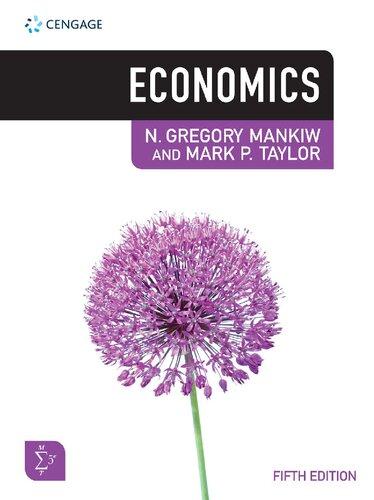The UK government has recognized the importance of information and behavioural economics to decision-making. The government partly
Question:
The UK government has recognized the importance of information and behavioural economics to decision-making.
The government partly funds the Behavioural Insights Team (BIT) in conjunction with an innovation charity and its employees, which number around 150. The BIT (also dubbed ‘The Nudge Unit’) lays claim to have:
[s]tarted life inside 10 Downing Street as the world’s first government institution dedicated to the application of behavioural sciences. Our objectives remain the same as they always have been:
• making public services more cost-effective and easier for citizens to use;
• improving outcomes by introducing a more realistic model of human behaviour to policy; and wherever possible;
• enabling people to make ‘better choices for themselves’.
The very fact that the UK government has invested in the BIT is testament to how far this branch of economics has come. It is almost fashionable to debunk traditional economics as being ‘broken’ and based on outmoded ways of thinking and suspect empirical techniques and assumptions.
The BIT is charged with looking at ways in which understanding of human behaviour can be utilized to improve outcomes which may include encouraging people to invest in pensions for their retirement, recycle waste more efficiently and donate organs, among other things. Of course, now we know that humans don’t behave rationally, it makes sense to get rid of old-fashioned economic ideas and replace them with shiny new behavioural economics ones. Doesn’t it?
Behavioural economics may, however, have more in common with traditional economics than meets the eye.
Reading some of the papers produced by leading figures in the movement reveals a considerable reliance on the use of mathematical models to reveal understanding. What Kahneman and his colleagues have done is to largely model human behaviour based on different assumptions than those in the standard economic model, but they produce models to predict human behaviour nonetheless, and this could be argued to be an extension of neo-classical economic principles of explaining behaviour.
Kahneman and Thaler would both argue that there is some merit in traditional economic theory which should be woven in with new insights. Some academics who have been put into the behavioural economics camp have argued that the insights research brings can be hijacked by politicians who are seeking to give the impression that policy is well thought out and based on sound research. For example, it is suggested that ‘nudge’ techniques can be the ‘best way’ to improve energy efficiency by, for example, making people aware of the amount of electricity they are using through having devices in the homes whirring away and ringing up the cash being ‘spent’, or by revealing more clearly what other ‘energy-efficient’ people are spending.
Would a policy based on this behavioural technique be as effective as increasing the price of electricity through a tax? We know that if prices rise, then demand falls – a ‘law’ of economics. Which policy would be more effective in increasing energy efficiency, and what would the consequences be in each case? In his book The End of Alchemy:
Money, Banking and the Future of Global Finance, the former Governor of the Bank of England, Mervyn King, notes:
The danger in the assumption of behavioural economics that people are intrinsically irrational is that it leads to the view that governments should intervene to correct ‘biases’ in individual decisions or ‘nudge’ them towards optimal outcomes. But why do we feel able to classify behaviour as ‘irrational’? Are policy-makers more rational than the voters whose behaviour they wish to modify?
Behavioural economics may be at a critical point in its development. Few doubt that it can reveal important insights into human behaviour, but as is often the case with such developments, those who have immersed themselves in the research associated with the field are often the most aware of its potential limitations.
Critical Thinking Questions
1 To what extent do you think behavioural economics offers a more ‘realistic model of human behaviour’?
2 Does the market mechanism allow people to ‘make better decisions for themselves’ or is it always the case that people need a ‘nudge’ to help them make better decisions?
3 Behavioural economics has been used as a means of trying to encourage people to donate organs by a ‘nudge’
which presents people with a scenario where they ask themselves whether they would have an organ transplant if they needed it, and if so this should be an incentive for them to help others. What are the assumptions behind such a policy, and to what extent do you think it will be successful in increasing organ donations?
4 Do you think that making people aware of their spending on electricity and gas is a more effective way of improving energy efficiency, or would a tax on gas and electricity raising its price be more effective? Justify your reasoning.
5 Look at the following extract from the quote by Mervyn King: ‘But why do we feel able to classify behaviour as “irrational”? Are policy-makers more rational than the voters whose behaviour they wish to “modify”?’ To what extent is the sort of behaviour described in this chapter ‘irrational’? Do you agree with Mervyn King that policymakers are no more rational than voters? Explain.
Step by Step Answer:






